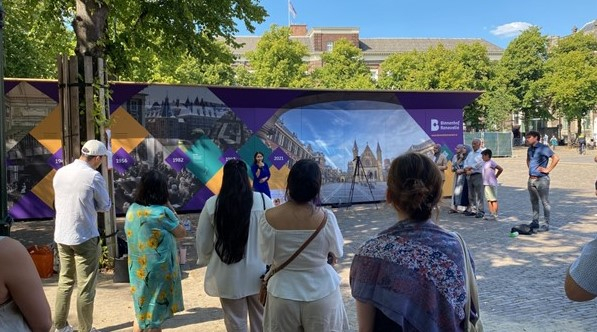15-08-2022Stop the collective removal of Afghan women from society
- Contribution by Anne-Floor Dekker, Program Manager for Gender, Peace, and Security during the meetings 'A Year After the Power Shift in Kabul - Towards Hope and Future' on August 14 at Het Plein in The Hague.
Peace Agreement not made for Afghans
Exactly a year ago, the Taliban took Kabul. It was the direct result of the peace agreement signed in early 2020 between the Trump administration and the Taliban. If the Taliban promised not to carry out any more attacks, the US would withdraw its military from Afghanistan. The peace agreement between Trump and the Taliban was primarily about the safety of Americans. It was not about the safety of Afghans, let alone the safety of women and girls in Afghanistan.
Warnings ignored
As early as 2020, women's rights organizations warned that with the Taliban regaining power, they would try to strip away the rights of women and girls and oppress minorities in society, as had already happened in other Taliban-controlled areas.
These warnings were taken little or not seriously at all. The Taliban had promised to respect women's rights after all. Women were even allowed to participate in the ‘inter-Afghan peace talks.’ "Let's wait and see if the Taliban keep their promises. Maybe it won't be so bad," was the reaction of much of the international community.
Alarm bells
Throughout 2020, more and more Afghan women's rights and human rights activists became targets of attacks. Prominent activists increasingly had to go into hiding or flee their country. And when it became clear in the spring of 2021 that the US would stick to the agreement even under Biden, women's organizations worldwide rang the alarm.
Besides the US, other countries like the Netherlands also prepared to withdraw their military. No one mentioned the potential impact of the collective military drawdown on the safety of the Afghan population. The Netherlands had invested over 20 years in women's rights in Afghanistan. Not a single Dutch parliamentary letter at the time discussed how to address the increasing insecurity of women and girls or the possible restriction of their rights.
Left to fend for themselves
WO=MEN and its members asked if protocols were in place to protect women and girls in Afghanistan, even if they had to flee. There were none. Women's rights activists and their families were left to fend for themselves.
On August 16, 2021, when Kabul had definitively fallen, Dutch NGOs did everything they could to bring their Afghan staff and partners to safety. Many had to go into hiding immediately. Death lists of prominent female politicians and human rights defenders circulated.
A week later, after much social and political pressure, the first women's rights activists landed safely at Schiphol after a nerve-wracking week.
To this day, efforts continue to bring other women and human rights activists to safety. Many have fled to other countries, some have been imprisoned, others murdered or simply disappeared. Others continue their struggle in Afghanistan.
Holding our breath
After the Taliban took Kabul, everything shut down, and the world held its breath: what would the Taliban do? Would they be as conservative as 20 years ago? With PR people who had grown up in the West, the political branch of the Taliban managed to maintain the keep up the illusion for a long time: women would be allowed to continue working. Girls would be allowed to go back to school. "Firstly we need to see tranquility return. Wait until after the New Year. Then everything will become clear."
Collective removal from society
For women's rights activists in Afghanistan, it was already clear. What they had long warned about came true. A year after the fall of Kabul, women and girls are being collectively and systematically removed from society.
After the Afghan New Year, secondary schools and most universities remained closed to girls.
Women are only allowed to work in certain jobs in healthcare and education.
Women can no longer hold political or government positions.
Women with their own businesses must close them or are no longer allowed to lead them.
Women and girls are no longer allowed to leave the house without male accompaniment.
Widows and single women depend on family, neighbors, or humanitarian organizations for food, shelter, and fuel.
Women must wear face veils again.
Since they can no longer be treated by male doctors, they have limited access to healthcare.
Female police officers, lawyers, and judges have been removed from their positions and are even being prosecuted. Reporting domestic violence is no longer possible.
Forced and child marriages are once again commonplace.
Women and girls who peacefully protest for their rights are beaten, arrested, murdered, or 'disappear' without a trace.
Women and girls are not taken seriously because they are women.
Out of sight
It is almost a year later now. Afghanistan is no longer in the news. What happens to women and girls in Afghanistan mostly happens out of the sight of the international community. But what happens in Afghanistan should never become normal. Not for the women and ethnic minorities in Afghanistan, and not for the women and ethnic minorities elsewhere.
Red lines
Normalizing and legitimizing the oppression of women ultimately affects us all. For the survival of democratic rule of law states like the Netherlands, we must collectively draw the red lines: this far and no further.
Always take the warnings of women's rights organizations extremely seriously. Support these organizations so they can continue to research human rights violations and advocate for equal rights and the position of women and girls.
Send mixed delegations for negotiations. Never accept that female aid workers can only operate with male accompaniment. Do everything possible to ensure that women can participate in political and administrative decision-making again.
Never accept that a population group is collectively removed from society!
Read more about what has happened over the past year:
